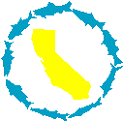CSPA |
| Your 501(c)(3) tax deductible cash donations are desperately needed if the fight for our fisheries is to continue. Read how you can donate! |
 Enter your Email address to sign up Enter your Email address to sign up for our Weekly Newsletter For Email Marketing you can trust |
More News
![]()
 CSPA Forces Regional Board to Withdraw Illegal Underground Regulation: Decision affects numerous permits for discharges to surface and ground water
CSPA Forces Regional Board to Withdraw Illegal Underground Regulation: Decision affects numerous permits for discharges to surface and ground water
by Bill Jennings, Executive Director, CSPA
September 29, 2009 -- In response to a petition by the California Sportfishing Protection Alliance (CSPA) to California's Office of Administrative Law (OAL), the Central Valley Regional Water Quality Control Board's (Regional Board) has withdrawn its illegal “underground regulation” that allowed dischargers to discharge salt to waterways at levels far exceeding water quality standards. On 28 September 2009, the Regional Board's Executive Officer issued a “Certification” to OAL that the “Management Guidance for Salinity in Waste Discharge Requirements” has been withdrawn. The action means that cities and industrial facilities will no longer be able to continue discharging concentrations of salt exceeding water quality standards far into the future but will have to begin efforts to achieve compliance within defined compliance schedules.
It's a huge victory for clean water and the law but unfortunately only an initial step in holding accountable a Regional Board that seems more intent on protecting polluters than the environment. CSPA still has more than 50 wastewater permits on appeal and is preparing another petition to OAL regarding yet another underground regulation.
Salt (or salinity) is a pervasive pollutant prevalent in wastewater effluent. Numerous waterways, including the San Joaquin River and San Joaquin Delta, are identified as “impaired” and incapable of supporting identified beneficial uses because of salinity. Groundwater basins throughout the Central Valley are impaired because of salinity. Excessive salinity is damaging to irrigated agriculture, sources of drinking water and freshwater aquatic life.
The State Water Resources Control Board, responding to a number of CSPA appeals, had already remanded several NPDES wastewater permits (Lodi, Tracy) and was proposing to remand the Stockton permit back to the Regional Board to implement proper salinity standards. However, numerous CSPA appeals were still pending.
On 28 May 2009, CSPA petitioned OAL to declare the Regional Board's policy for addressing salinity issues in wastewater discharge permits to be an “underground regulation” in violation of law. OAL accepted CSPA's petition and directed the Regional Board to formally respond by 28 September 2009. Beyond the Certification of Withdrawal, the Regional Board also sent its program managers a 25 September 2009 letter stating, “Effective immediately, staff should not consult, cite or use the Salinity Guidance in making permitting decisions or recommendations.”
State agencies are required to adopt regulations to enforce or implement the laws they administer. These regulations must be adopted through formal rule-making procedures established by the Administrative Procedure Act (APA) of the California Government Code. The Regional Board's policy for salt control, as outlined in the Management Guidance for Salinity in Waste Discharge Requirements, was never adopted through formal procedures outlined in the APA. The policy ignored legally promulgated state and federal regulations and illegally extended the timeframe for controlling discharges of salts thereby ensuring increased degradation and pollution of state and federal waters by salinity based pollutants.
In an effort to avoid costly upgrades to treatment facilities, municipal and industrial dischargers have heavily lobbied the Regional Board to ignore long-existing regulatory mandates in the federal Clean Water Act and California's Porter-Cologne Water Quality Control Act that require dischargers to control salt in wastewater discharges. Under the law, where a reasonable potential exists to cause or contribute to a violation of a water quality objective, wastewater discharge permits must contain final enforceable effluent limits to prevent pollution and degradation of the state's surface and ground waters.
The Regional Board acquiesced to discharger demands and established a policy that granted discharges interim “performance-based” limits allowing them to continue to discharge salts at current levels. The policy established compliance schedules of 15-20 years for the discharger to conduct studies and implement vague unenforceable salinity reduction programs. Since the law only allows compliance schedules of 5 years for surface water discharges and 10 years for discharges to land, the Regional Board policy instructed permit writers to avoid placing compliance schedules in “enforceable parts of the permit” to avoid mandatory penalties.
Regional Quality Control Board Certification
Regional Quality Control Board memo to Program Managers